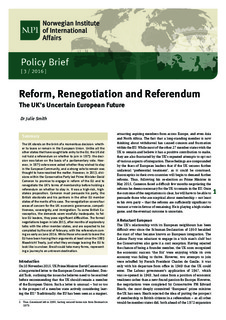| dc.description | The UK stands on the brink of a momentous decision: whether to leave or remain in the European Union. Unlike all the other states that have sought late entry to the EU, the UK did not hold a referendum on whether to join in 1973: the decision was taken on the basis of a parliamentary vote. However, in 1975 voters were asked whether they wished to stay in the European Community, and a strong vote to remain was thought to have resolved the matter. However, in 2013, divisions within the Conservative Party led Prime Minister David Cameron to promise to engage in reform of the EU and to renegotiate the UK’s terms of membership before holding a referendum on whether to stay in. It was a high-risk, high-stakes proposition. Cameron must persuade his party, the British lectorate and his partners in the other EU member states of the merits of his case. The enegotiation covers four areas of concern for the UK: economic governance, competitiveness, sovereignty, and immigration. To some British Eurosceptics, the emands seem woefully inadequate; to fellow EU leaders, they pose significant difficulties. The formal negotiations began in late 2015, after months of exploratory talks with the other member states, and are expected to be completed by the end of February, with the referendum coming as early as June 2016. While those who seek to leave the EU have been honing their arguments at least since the 1993 Maastricht Treaty, just that they envisage leaving the EU to look like is unclear. Brexit could take many forms, representing a journey to an unknown destination | nb_NO |

